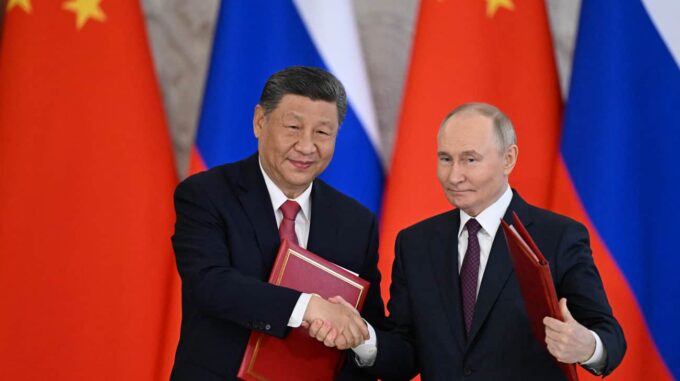Escalation of Multi-Vector Relations: Putin and Xi Jinping Sign a New Stage of Strategic Partnership

After several years of tense diplomatic contacts, an important event took place in the Kremlin that could influence the global geopolitical situation. Russian President Vladimir Putin and China's leader Xi Jinping signed a document on Thursday, May 8, marking a new step in deepening the strategic partnership between the two countries. This agreement not only formalizes long-standing diplomatic and trade relations but also lays the foundation for closer cooperation in the fields of economy, security, and global influence. The meeting, held at the historic Kremlin residence, became a landmark event in the context of geopolitical confrontation and global competition on the world stage. It is expected that the signed document will reinforce the principles of modern relations between Moscow and Beijing, while also reaffirming the ambitions of both nations to act jointly in resolving international crises and problems. In his speech after the negotiations, Vladimir Putin emphasized that Russian-Chinese relations are more than just partnership—they are self-sufficient and capable of demonstrating growth in all directions. The expansion of cooperation involves increasing the share of national currencies in trade settlements between the two countries, which serves as an important signal to the West and the global financial system, increasingly oriented towards globalization directly influenced by political decisions in Beijing and Moscow. Amid this diplomatic event, it is worth recalling that as early as spring 2022, less than three weeks before the outbreak of the war in Ukraine, the leaders of Russia and China signed a document on "boundless partnership." This indicates the presence of a stable strategic alliance, which is evidently stronger than ever, especially considering the international sanctions imposed on Moscow by Western countries. Beyond economic aspects, an important component of the new agreement is its military-political context. During his visit to Moscow, on the eve of May 9 — Victory Day in the Great Patriotic War — Xi Jinping expressed support for Russia in its struggle against the West. He reiterated that Putin and the Russian government are his reliable allies in shaping a new world order, where the pursuit of multi-vector diplomacy and independence from global centers of influence prevail. Particularly noteworthy was the participation of Chinese military personnel in the military ceremony on Red Square. According to Russian officials, the contingent of Chinese servicemen will be the largest among foreign contingents participating in the celebratory events, demonstrating solidarity and strategic friendship between the two states. This is not just a military gesture but also a symbol of close cooperation in security and defense spheres. Overall, Xi Jinping's visit to Moscow and the signing of the bilateral agreement signal a shift in the geopolitical balance worldwide and an effort by China and Russia to strengthen their positions on the international stage. In the face of modern challenges—from increased sanctions to global conflicts—this alliance could become one of the decisive factors in shaping a new global system after the end of the era of Western dominance. Thus, the events of May 8 continue to hold the potential for new changes in world politics, and the visit of the most influential leaders of the two largest countries demonstrates that the strategic alliance between Moscow and Beijing is receiving a new level of official support and international recognition.

